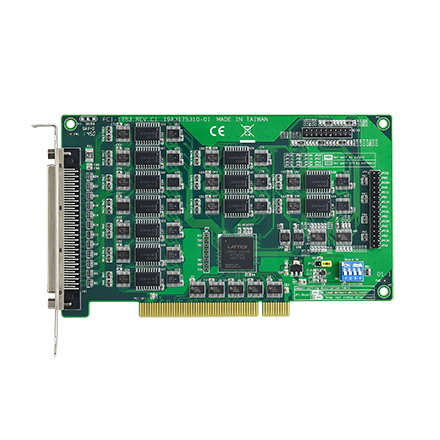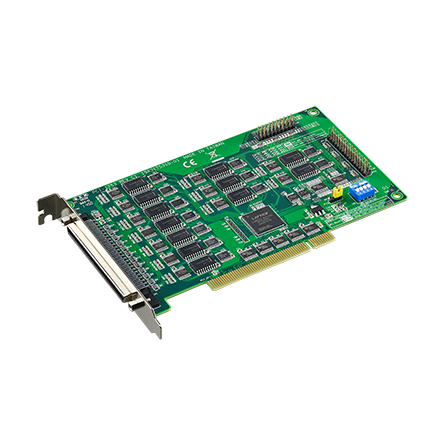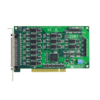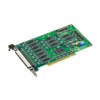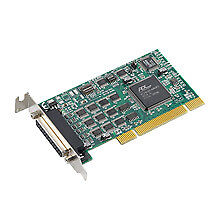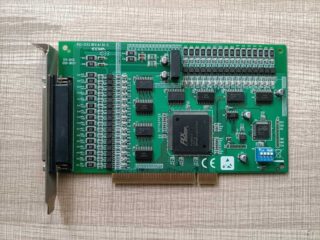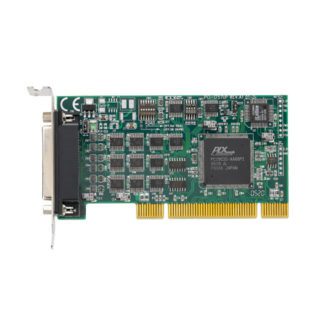PCI-1753 – 96bit Digital I/O Card PCI BUS
177,00 € Excl. VAT
Features PCI-1753 :
• 96/192 TTL digital I/O lines
• Emulates mode 0 of 8255 PPI
• Buffered circuits for higher driving capacity than 8255
• Multiple-source interrupt handling
• Interrupt output pin for simultaneously triggering external
devices with the interrupt
• Output status read-back
• “Pattern match” and “Change of state” interrupt functions for
critical I/O monitoring
• Keeps I/O setting and digital output values when hot system
reset
• Supports dry contact and wet contact
• High-density 100-pin SCSI connector
Introduction PCI-1753 :
The PCI-1753 is a 96-bit digital I/O card for the PCI bus, which can be
extended to 192 digital I/O channels by connecting with its extension
board, PCI-1753E. The card emulates mode 0 of the 8255 PPI chip,
but the buffered circuits offer a higher driving capability than the 8255.
The 96 I/O lines are divided into twelve 8-bit I/O ports: A0, B0, C0, A1,
B1, C1, A2, B2, C2, A3, B3 and C3. Users can configure each port as
input or output via software.
Easy to Install: Plug and Play
The PCI-1753 uses a PCI controller to interface the card to the PCI bus.
The controller fully implements the PCI bus specification Rev 2.1. All
bus relative configurations, such as base address and interrupt
assignment, are automatically controlled by software.
Dry Contact Support for Digital Input
Each digital input channel of the PCI-1753/1753E accepts either 0 ~ 5
VDC wet contact or dry contact inputs. This dry contact capability allows
the channel to respond to changes in external circuitry (e.g., the closing
of a switch in the external circuitry) when no voltage is present in the
external circuit.
Reset Protection Fulfills the True Requirement of Industrial
Applications
When the system is hot reset (the power is not turned off), the
PCI-1753/1753E can either retain the value of the last I/O port settings
and outputs, or return to its default configuration, depending on the
jumper setting. This function protects the system from wrong operations
during unexpected system resets.
Interrupt Functions Ensure Faster System Response
Two lines of each port C (i.e., ports C0, C1, C2 and C3) are connected
to an interrupt circuit. The “Interrupt Control Register” of the
PCI-1753/PCI-1753E controls how these signals generate an interrupt.
Two interrupt request signals can be generated at the same time, and
then the software can process these two request signals by ISR. The
dual interrupt sources provide the card with more capability and flexibility.
The PCI-1753/1753E also provides “Pattern Match” interrupt function
for port A0. The card monitors the states of port A0 and compares
them with a pre-set pattern. When the received state matches the preset pattern, the PCI-1753/1753E generates an interrupt signal to the
system.
“Change of State” interrupt function is provided at port B0. When any
signal line of port B0 changes its state, the card generates an interrupt
to the system to handle this event.
These interrupt functions release the CPU from the burden of pulling all
I/O points, enabling a PC to handle more I/O points with higher
performance.
Cost Savings for Increasing the Number of Input/Output Lines
Industrial users are needing more and more digital I/O lines to transmit
data or to monitor/control outside devices. To meet this trend and to
satisfy user’s budget considerations, Advantech has developed an
extension board for the PCI-1753 called the PCI-1753E. The PCI1753E has almost the same structure as the PCI-1753, without the
interface controller. It shares PCI-1753’s interface controller through a
10-cm flat cable connection, so users can spend less money while
doubling the number of input/output lines.
Accessories for PCI-1753/1753E
The PCI-1753/1753E uses a 100-pin SCSI female connector. For easy
signal wiring, a PCI-1753 can be connected to two ADAM-3968s by a
100-pin to 2×68-pin SCSI cable (part number PCL-10268). The
ADAM-3968 allows easy access for wiring the individual pins of a
68-pin SCSI connector. An ADAM-3968/50 adapter board converts the
68-pin connector to two opto-22 compatible 50-pin box headers
for connecting the PCI-1753/1753E to daughterboards, such as
PCLD-782B and PCLD-785B.
2 in stock
Features PCI-1753 :
• 96/192 TTL digital I/O lines
• Emulates mode 0 of 8255 PPI
• Buffered circuits for higher driving capacity than 8255
• Multiple-source interrupt handling
• Interrupt output pin for simultaneously triggering external
devices with the interrupt
• Output status read-back
• “Pattern match” and “Change of state” interrupt functions for
critical I/O monitoring
• Keeps I/O setting and digital output values when hot system
reset
• Supports dry contact and wet contact
• High-density 100-pin SCSI connector
Introduction PCI-1753 :
The PCI-1753 is a 96-bit digital I/O card for the PCI bus, which can be
extended to 192 digital I/O channels by connecting with its extension
board, PCI-1753E. The card emulates mode 0 of the 8255 PPI chip,
but the buffered circuits offer a higher driving capability than the 8255.
The 96 I/O lines are divided into twelve 8-bit I/O ports: A0, B0, C0, A1,
B1, C1, A2, B2, C2, A3, B3 and C3. Users can configure each port as
input or output via software.
Easy to Install: Plug and Play
The PCI-1753 uses a PCI controller to interface the card to the PCI bus.
The controller fully implements the PCI bus specification Rev 2.1. All
bus relative configurations, such as base address and interrupt
assignment, are automatically controlled by software.
Dry Contact Support for Digital Input
Each digital input channel of the PCI-1753/1753E accepts either 0 ~ 5
VDC wet contact or dry contact inputs. This dry contact capability allows
the channel to respond to changes in external circuitry (e.g., the closing
of a switch in the external circuitry) when no voltage is present in the
external circuit.
Reset Protection Fulfills the True Requirement of Industrial
Applications
When the system is hot reset (the power is not turned off), the
PCI-1753/1753E can either retain the value of the last I/O port settings
and outputs, or return to its default configuration, depending on the
jumper setting. This function protects the system from wrong operations
during unexpected system resets.
Interrupt Functions Ensure Faster System Response
Two lines of each port C (i.e., ports C0, C1, C2 and C3) are connected
to an interrupt circuit. The “Interrupt Control Register” of the
PCI-1753/PCI-1753E controls how these signals generate an interrupt.
Two interrupt request signals can be generated at the same time, and
then the software can process these two request signals by ISR. The
dual interrupt sources provide the card with more capability and flexibility.
The PCI-1753/1753E also provides “Pattern Match” interrupt function
for port A0. The card monitors the states of port A0 and compares
them with a pre-set pattern. When the received state matches the preset pattern, the PCI-1753/1753E generates an interrupt signal to the
system.
“Change of State” interrupt function is provided at port B0. When any
signal line of port B0 changes its state, the card generates an interrupt
to the system to handle this event.
These interrupt functions release the CPU from the burden of pulling all
I/O points, enabling a PC to handle more I/O points with higher
performance.
Cost Savings for Increasing the Number of Input/Output Lines
Industrial users are needing more and more digital I/O lines to transmit
data or to monitor/control outside devices. To meet this trend and to
satisfy user’s budget considerations, Advantech has developed an
extension board for the PCI-1753 called the PCI-1753E. The PCI1753E has almost the same structure as the PCI-1753, without the
interface controller. It shares PCI-1753’s interface controller through a
10-cm flat cable connection, so users can spend less money while
doubling the number of input/output lines.
Accessories for PCI-1753/1753E
The PCI-1753/1753E uses a 100-pin SCSI female connector. For easy
signal wiring, a PCI-1753 can be connected to two ADAM-3968s by a
100-pin to 2×68-pin SCSI cable (part number PCL-10268). The
ADAM-3968 allows easy access for wiring the individual pins of a
68-pin SCSI connector. An ADAM-3968/50 adapter board converts the
68-pin connector to two opto-22 compatible 50-pin box headers
for connecting the PCI-1753/1753E to daughterboards, such as
PCLD-782B and PCLD-785B.
| Dimensions | 236 × 160 × 55 cm |
|---|
Shipping Policy
Shipping Worldwide
Refund Policy
Refunds
Returns are only accepted if product are not as specified or have any defects.Once your return is received and inspected, we will send you an email to notify you that we have received your returned item. We will also notify you of the approval or rejection of your refund.
If you are approved, then your refund will be processed, and a credit will automatically be applied to your credit card or original method of payment, within a certain amount of days.
Late or missing refunds
If you haven’t received a refund yet, first check your bank account again.
Then contact your credit card company, it may take some time before your refund is officially posted.
Next contact your bank. There is often some processing time before a refund is posted.
If you’ve done all of this and you still have not received your refund yet, please contact us at {email address}.
Sale items
Only regular priced items may be refunded. Sale items cannot be refunded.
Exchanges
We only replace items if they are defective or damaged.
Gifts
If the item was marked as a gift when purchased and shipped directly to you, you’ll receive a gift credit for the value of your return. Once the returned item is received, a gift certificate will be mailed to you.
If the item wasn’t marked as a gift when purchased, or the gift giver had the order shipped to themselves to give to you later, we will send a refund to the gift giver and they will find out about your return.
Shipping returns
To return your product, you should mail your product.
You will be responsible for paying for your own shipping costs for returning your item. Shipping costs are non-refundable. If you receive a refund, the cost of return shipping will be deducted from your refund.
Depending on where you live, the time it may take for your exchanged product to reach you may vary.
If you are returning more expensive items, you may consider using a trackable shipping service or purchasing shipping insurance. We don’t guarantee that we will receive your returned item.
Need help?
Cancellation / Return / Exchange Policy
Overview
Our refund and returns policy lasts 30 days. Returns are only accepted if product are not as specified or have any defects.If 30 days have passed since your purchase, we can’t offer you a full refund or exchange.
To be eligible for a return, your item must be unused and in the same condition that you received it. It must also be in the original packaging.
Several types of goods are exempt from being returned. Perishable goods such as food, flowers, newspapers or magazines cannot be returned. We also do not accept products that are intimate or sanitary goods, hazardous materials, or flammable liquids or gases.
Additional non-returnable items:
- Gift cards
- Downloadable software products
- Some health and personal care items
To complete your return, we require a receipt or proof of purchase.
Please do not send your purchase back to the manufacturer.
There are certain situations where only partial refunds are granted:
- Book with obvious signs of use
- CD, DVD, VHS tape, software, video game, cassette tape, or vinyl record that has been opened.
- Any item not in its original condition, is damaged or missing parts for reasons not due to our error.
- Any item that is returned more than 30 days after delivery
General Inquiries
There are no inquiries yet.
Related products
-
PCI-1763UP – 8 Channel Relay & 8 Channel Isolated DI Card
212,00 € Excl. VATAdd to cartFeatures PCI-1763UP
√8 relay output channels and 8 isolated digital input channels
√LED indicators to show activated relays
√8 Form C type relay output channels
√Output status read-back
√Retained relay output values when hot system reset
√High-voltage isolation on input channels (2,500 VDC)
√High ESD protection (2,000 VDC)
√High over-voltage protection (70 VDC)
√Wide input range (10 ~ 50 VDC)
√Interrupt handling capability
√Support Universal PCI Bus
√Low Profile PCI card
√BoardID™ switch PCI-1763UPIntroduction
PCI-1763UP relay actuator and isolated digital input card is an add-on card for the PCI bus. It provides 8 optically-isolated digital inputs with isolation protection of 2500 VDC for
collecting digital inputs in noisy environments, and 8 relay actuators for serving as on/off control devices or small power switches. For easy monitoring, each relay is equipped with
one red LED to show its on/off status. PCI-1763UP’s eight optically-isolated digital input channels are ideal for digital input in noisy environments or with floating potentials. The low
profile PCI form factor and universal PCI connector (V2.2 compliant), meet requirements for size and reduced power consumption.Specifications PCI-1763UP:
Isolated Digital Input
Channels 8
Input Voltage Logic 0: 3 V max.
Logic 1: 10 V min. (50 V max.)
Input Current 3.16 mA @ 10 VDC
17.3 mA @ 50 VDC
Interrupt Capable Ch. 8
Isolation Protection 2,500 VDC
Overvoltage Protection 70 VDC
Opto-isolator Response 25 µs
Input Resistance 2.8 KΩ
Relay Output
Channels 8
Relay Type DPDT, Form C
Contact Rating 240 VAC @ 0.25 A, or 30 VDC @ 1 A
Relay on Time 5 ms max.
Relay off Time 4 ms max.
Life Span 1 x 10^7 @ 6 V/100 mA
Resistance Contact: < 50 mΩ
Insulation: 1 GΩ min. (at 500 VDC)General
I/O Connector Type DB44 female
Dimensions 119.91 x 64.41 mm (Low-Profile MD1)
Power Consumption +5V @ 107.5 mA (typical)
+5V @ 301.3 mA (max.)
Operating Temperature 0 ~ 60° C (32 ~ 140° F) (refer to IEC 68-2-1,2)
Storing Temperature -20 ~ 70° C (-4 ~158° F)
Storing Humidity 5 ~ 95 % RH, non-condensing (refer to IEC 68-2-3)Ordering Information
PCI-1763UP Low-profile 8-ch Relay/Isolated DI Card
PCL-10144-1 DB 44-pin cable, 1 m
ADAM-3944 DB-44 Wiring Terminal for DIN-rail mounting0 out of 5 -
PCI-1733 – 32Ch.Isolated DI Card PCI BUS
149,00 € Excl. VATAdd to cartFeatures PCI-1733 :
• 32 isolated, bidirectional digital input
channels
• High-voltage isolation (2,500 V DC)
• Interrupt capacity
• D-type connectors for isolated input
channels
• Reverse voltage protection for isolated
input channels
(up to 24 VDC)0 out of 5 -
PCI-1757UP – 24bit ttl Digital I/O Card Low Profile PCI BUS Card
119,00 € Excl. VATAdd to cartFeatures PCI-1757UP :
• Low profile PCI card PCI-1757UP
• Universal PCI card, adapt 3.3V and 5V PCI slot
• 24 TTL level digital I/O lines
• Emulates mode 0 of 8255 PPI
• Buffered circuits provide higher driving capability
• Output status read-back
• I/O configurable by software or on board DIP switch
• Keeps port I/O settings and digital output states after hot reset
• Board ID set by DIP switch
• High density D-SUB 25-pin connectorIntroduction:
The PCI-1757UP is a 24-bit DI/O 1low profile PCI card. It meets the PCI
standard REV.2.2 (universal PCI expansion card), and works with both
3.3V and 5V PCI slot. It provides users with 24 bits of parallel digital
input/output, emulates mode 0 of the 8255 PPI chip, but the buffered
circuits offer a higher driving capability than the 8255.Specifications PCI-1757UP :
Digital Input
• Logic High Voltage: 2.0 to 5.25 V
• Logic Low Voltage: 0.0 to 0.80 V
• High Level Input Current: 20 mA
• Low Level Input Current: -0.2 mA
Digital Output
• Logic High Voltage: 2.4 V minimum
• Logic Low Voltage: 0.4 V maximum
• High Level Input Current: 15 mA maximum (source)
• Low Level Input Current: 24 mA maximum (sink)
• Driving Capability: 15 LS TTL
Interrupt Source
• PC0, PC4
General
• Connector: one D-SUB 25-pin female connector
• Power Consumption: 5 V @ 140 mA (Typical)
• Operating Temperature: 0 ~ 70° C (32° F ~ 158° F)
• Storage Temperature: -20 ~ 80° C (-4° F ~ 176° F)
• Humidity: 5% ~ 95% non-condensing• Dimension: 119.91 x 64.41 mm (4.721″ x 2.536″) Low profile PCI
MD1 card sizeOrdering Information
❑ PCI-1757UP
24-channel Digital Input/Output Card
❑ ADAM-3925
DB-25 wiring terminal for DIN-rail mounting0 out of 5

